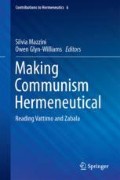Abstract
This article develops from one of the central theses formulated by Vattimo and Zabala in Hermeneutic Communism. It constitutes the metaphysical idea of a unique and objective truth being the core of a totalitarian and violent political system that establishes itself as absolute by excluding any form of alternative or multiplicity. It focuses on how the ‘winners of history’ gain and maintain their political, economic, and social power, giving rise to what Vattimo and Zabala describe as today’s ‘armed capitalism’. In order to take a stand against this situation, the two authors suggest a possible way out: ‘the end of truth is the beginning of democracy’. But is it possible to practice politics without the idea of truth? And if so, how? In this respect my contribution investigates the subversive as well as creative potentialities of a ‘hermeneutic communism’, examining if and how it would be possible to witness a ‘rebirth of democracy’ thanks to the ‘victory of the weak’ - i.e. of the so-called ‘losers of history’. Through an aesthetical inquiry about the political and communicative implication of the paradigmatic and ambivalent literary figure of Hamlet, I will further attempt to explore the importance of a non-verbal communication in an hermeneutical, democratic dialogue. By doing this, I will also pose a paradoxical, quite tragic question: will the strong be isolated and marginalized, if the weak would win?
Access this chapter
Tax calculation will be finalised at checkout
Purchases are for personal use only
Notes
- 1.
Gianni Vattimo – Santiago Zabala: Hermeneutic Communism. From Heidegger to Marx. New York, Columbia University Press, 2011 (from here quoted as HC), p. 121.
- 2.
Ibidem (my italics).
- 3.
“[…] both have had a real sight into the essence of things: they have realized, and acting disgusts them […]” M.t. from Friedrich Nietzsche: Die Geburt der Tragödie aus dem Geiste der Musik, in: Giorgio Colli – Mazzino Montinari (Eds.), Nietzsche Werke. Kritische Gesamtausgabe, 3,1, Berlin-New York 1972, pp. 52–3.
- 4.
William Shakespeare, The tragedie of Hamlet Prince of Denmarke, in Stanley Wells – Gary Taylor (Eds.): The complete Works, Oxford 1986, p. 753.
- 5.
“[…] that is, individuals capable of constructing [their] own alternative interpretation of the world instead of submitting to the official truth.”(HC, p. 137)
- 6.
HC, pp. 110–1.
- 7.
HC, p. 98.
- 8.
HC, p. 5.
- 9.
It is known that Hamlet expressed himself with apparently absurd and meaningless puns – also in order people to believe he got mad. Some interpreters of Shakespeare (among others, Kott), have however revealed Hamlet’s ability to unhinge words, and in particular the logical-rational language, releasing at the same time, subversively, different and significant, but hidden and ‘marginal’ meanings.
- 10.
Because the ghost could not offer more rational reasons than other courtiers, in order to support his thesis, I call Hamlet’s decision to believe his father’s ‘thuth’ a kiergaardian ‘leap of faith’.
- 11.
Shakespeare, p. 753.
- 12.
See for example HC, pp. 82–84.
- 13.
But I think it is not necessary to underline the important role that also rationality and logical-argumentative-analytical language plays (or at least played) in our culture: which is very evident, for exemple, in Bertold Brecht’s theatre and theoretical works.
- 14.
HC, pp. 101–102.
- 15.
See i.a. Luigi Pareyson: Teoria della Formatività, Torino 1954.
- 16.
Shakespeare, p. 755.
- 17.
Nestor Cozetti – Augusto Boal: Entrevista: No palco, soluções para a vida real, 05/05/2009; http://josekuller.wordpress.com/38-entrevista-com-augusto-boal/ (date of access: 16.01.2013)
- 18.
See Augusto Boal: Legislative Theatre: Using performance to Make Politics, London 1998.
- 19.
“[…] bolla informatico-mediatica […]” (Gianni Vattimo: Ecce comu, Roma 2007, p. 46, m.t.).
- 20.
“[…] è il costituirsi dei partiti politici in burocrazie chiuse e autoreferenziali, che hanno con gli elettori il solo contatto dei mass media.” (Ibi, p. 44)
- 21.
Paraphrasing an expression of the philosopher Ernst Bloch in his main work Das Prinzip Hoffnung, Frankfurt a.M. 1959, p. 256 (“Fetischist der sogenannten Tatsachen”).
- 22.
HC, pp. 116–7.
- 23.
Ibi, p. 135.
- 24.
See Pier Paolo Pasolini: Scritti Corsari, Milan 1975 (Corsair Writings).
- 25.
HC, p. 2.
- 26.
See my article ‘Bloch und Pasolini. Das neue Opium des Volkes’ in Doris Zeilinger (ed.): VorSchein. 31/2010, pp. 141–150.
- 27.
It. Appunti per un’Orestiade africana.
- 28.
HC, p. XX.
Author information
Authors and Affiliations
Corresponding author
Editor information
Editors and Affiliations
Rights and permissions
Copyright information
© 2017 Springer International Publishing AG
About this chapter
Cite this chapter
Mazzini, S. (2017). If the Weak Would Win: The Specter of Communism and the Re-birth of Democracy. In: Mazzini, S., Glyn-Williams, O. (eds) Making Communism Hermeneutical. Contributions to Hermeneutics, vol 6. Springer, Cham. https://doi.org/10.1007/978-3-319-59021-9_15
Download citation
DOI: https://doi.org/10.1007/978-3-319-59021-9_15
Published:
Publisher Name: Springer, Cham
Print ISBN: 978-3-319-59019-6
Online ISBN: 978-3-319-59021-9
eBook Packages: Religion and PhilosophyPhilosophy and Religion (R0)

